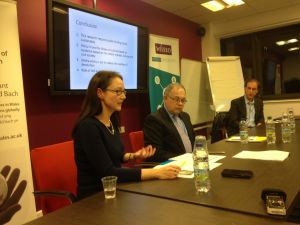The director of a major social science research body has warmly praised work done as part of the Wales Media Audit 2015. The Audit was produced by the Media Policy Group of the Institute of Welsh Affairs.

At an event in Cardiff on 28th January, the focus was on a special section of the Audit, the Review of Policy Development. Prof Paul Chaney, director of WISERD (Wales Institute of Social and Economic Research Data and Methods) was hugely appreciative of the work undertaken in this Review. It examined key thinking on media policy in Wales since 2008. It was carried out by Dr Ruth McElroy and Dr Christina Papagiannouli of the Centre for the Study of Media in Small Nations at the University of South Wales in collaboration with Hywel Wiliam (Director, Advisors in Media).
The Review identified concerns about media provision for Wales and summarised the findings and recommendations of all significant reports between 2008 and 2015. It also examined relevant academic research and considered the provision of journalism in Wales. It was a most important basis for the recommendations made by the IWA’s Media Policy Group.
In 2008 the Welsh Government commissioned the IWA to carry out a similar audit but no government funding was forthcoming to update it, even in the light of the current BBC Charter Review process and the many changes in the media landscape since the earlier audit. The funding from WISERD was a crucial element in the IWA’s capacity to interrogate both facts and thinking on media in Wales. This was, indeed, the only source of funding available apart from the IWA’s own membership-based resources.
This resulting section of the Audit will remain a valuable resource for researchers and policy-makers. The Audit as a whole has been frequently cited in the Charter Review process and in inquiries into broadcasting in Wales both at Westminster and the Welsh Assembly.
At the event, Mediating Civil Society: is Wales getting the Media Services it deserves? Dr McElroy and Mr Wiliam presented the results of their collaboration. They stressed the need for evidence-based policy-making and noted that media policy in Wales has not yet addressed the realities of the devolutionary process. The weaknesses in Wales’s media provision present serious challenges to civil society and democracy.
At the seminar, held as part of WISERD’s Civil Society Seminar Series, Prof Chaney acknowledged both the variety of analysis achieved and its impact, saying, “WISERD couldn’t have hoped for a better use of the funding. It was exactly what we hoped for.”
WISERD is a collaboration between the Universities of Aberystwyth, Swansea, South Wales, Cardiff and Bangor. One of its four aims is to strengthen the impact of social science research on the development of policy in the public, private and third sectors through a focus on knowledge exchange and engagement. This aim has certainly been achieved in the case of this Review of Policy Development.
The IWA is committed to engaging with academics in its scrutiny and development of media policy. Seven of the eight Welsh universities had a presence at the IWA’s Cardiff Media Summit in November 2015. This presence was regarded by the IWA as essential and as a significant opportunity to bring together academics and media practitioners. The universities who attended the Summit are all enthusiastic about the experience and future collaboration.
The support of WISERD has been an encouraging and welcome sign of support from academia for the application of research to a challenging facet of the creative industries and their policy base.